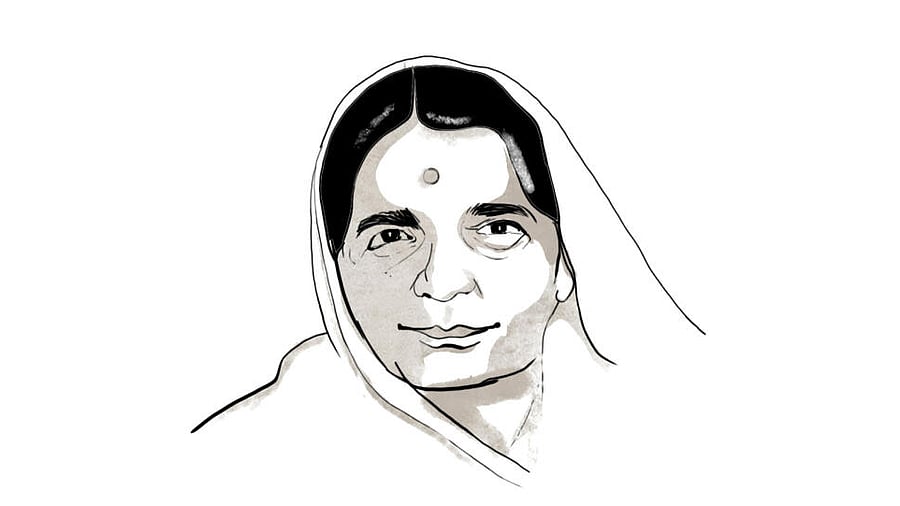
DH Illustration
Shruti was extremely excited. She was going to meet Hansa Mehta, the renowned freedom fighter and women’s rights activist later that day. And what’s more, Hansa Mehta had agreed to talk to her for an article for her school magazine.
Shruti was very punctual in reporting for the interview and almost as soon as the two of them had exchanged greetings, she blurted out her first question, “When you were born in Baroda in 1897, what were things like for women?”
Hansa looked kindly at Shruti and replied, “Good and bad. The age-old traditions were still very much there and many women were confined to their homes. But we had a young king, Sayajirao Gaekwad III, who was attempting to change things for the better. That was the good part.”
Hansa paused and continued, “I was lucky. My family was very progressive. My father, Manubhai, was a professor. My grandfather, Nandshankar, was Gujarati’s first novelist. They were educated and wanted to change the old ways. So I went to school. Why, I even got to go to college. It did not end there. In 1919, my father did not hesitate to send me to England when I secured admission at the London School of Economics.”
“England? Things must have been so much better for women there, right?” Shruti asked expectantly.
“Actually, they weren’t,” replied Hansa rather unexpectedly. “For instance, women couldn’t vote in the elections then. And there were a bunch of people who were demanding the vote for women. They were called ‘suffragettes’. I joined them. But in the time I was there, we didn’t succeed. It was only in 1928 that this right was granted in England.”
Hansa continued, “But the best part of my time in England was that I met and interacted with Sarojini Naidu. It was through her in 1922 that I met Mahatma Gandhi when I was back in India.”
“Where did you meet him?” Shruti enquired.
“In Sabarmati Jail in Ahmedabad where the British had put him. Meeting him changed my life!” Hansa got up and looked out of the window when she said this.
Clearly, it was more than just a meeting. Almost on cue, she continued, “He changed my life completely. I now decided to dedicate my life to public service.”
Post this meeting with Gandhi, Hansa Mehta’s life did take a complete U-turn. She began working in the freedom movement and in 1926, she was elected to the Bombay Schools Committee to work on women’s education.
Hansa smiled at Shruti and then said, “Amidst all this, it was so easy to believe that life would go exactly how I wanted it. But it didn’t. In 1928, when I wanted to marry Dr. Jivraj Mehta, guess who opposed me the most? My own father! He just wasn’t comfortable with my marrying out of caste. It was only when Maharaj Sayajirao intervened that he reluctantly agreed.”
Shruti gasped and exclaimed, “An inter-caste marriage was such a big scandal then?”
Hansa nodded and added, “Why, it is so even now. It is such a rare thing. Perhaps your generation can change that!”
Shruti’s next question was about Hansa’s participation in the Salt Satyagraha of 1930.
Hansa Mehta thought for a moment before replying. “I was in jail for three months for participating and then all political prisoners were released after the Gandhi-Irwin Pact.”
“Didn’t your family then warn you off politics?”
“Not really. In fact, the funny thing is that when I was arrested again in 1932, my husband was also arrested even though he did not participate in politics. He was just unlucky — he was married to me.”
“When you think back, what do you think were your greatest achievements?” Shruti asked.
Pat came the reply, “Participating in the struggle to attain our freedom, I consider the greatest. But there is one more thing I am proud of. In 1947, I became a delegate to the UN and a year later, I was involved in drafting the Universal Declaration of Human Rights. The first sentence of that declaration read, ‘All men are born free and equal in dignity and rights.’ As soon as I saw it, I knew it needed to be changed. On my insistence and with the support of Eleanor Roosevelt, we altered it to ‘All human beings are born free and equal in dignity and rights.’ It was an important step for gender equality.”
Shruti was wonderstruck. “So that’s where it began. Today, my teacher insists that we use ‘chairperson’ instead of ‘chairman’, ‘businessperson’ instead of ‘businessman’, ‘police officer’ instead of ‘policeman’. I can see why. By using ‘man’, we are displaying a gender bias. I am delighted to know that it was you who forced the world to make this change.”
There was much more that Shruti wanted to ask Hansa Mehta. But she could see that Hansa had other things to do. Perhaps another day…